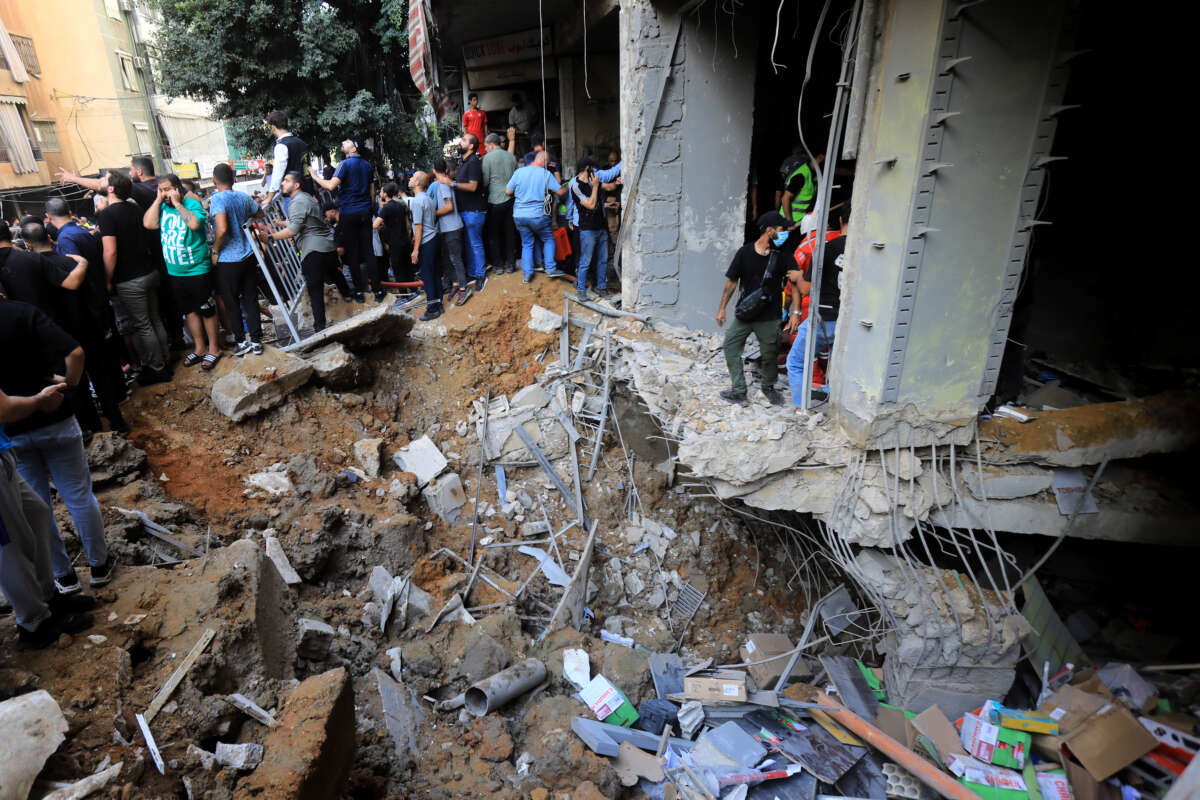Support justice-driven, accurate and transparent news — make a quick donation to Truthout today!
As Israel followed up its remote bombings of communications devices in Lebanon with airstrikes on Beirut, the United Nations Security Council held an emergency session Friday during which officials urgently called for an immediate cease-fire and warned that the Middle East is on “the brink of catastrophe.”
“We risk seeing a conflagration that could dwarf even the devastation and suffering witnessed so far,” U.N. Under-Secretary-General for Political and Peacebuilding Affairs Rosemary DiCarlo told representatives of the 15-member Security Council (UNSC) during the session.
“It is not too late to avoid such folly. There is still room for diplomacy,” DiCarlo stressed. “I also strongly urge member states with influence over the parties to leverage it now.”
Officials voiced alarm over this week’s remote bombings of pagers, walkie-talkies, and other devices Israel said belonged to members of Hezbollah, the Lebanese political and paramilitary group, which killed at least 37 people including two children and wounded thousands more. While Israel has not claimed responsibility for the attacks, U.S. officials have attributed the attacks to their key ally.
“These attacks represent a new development in warfare, where communication tools become weapons,” U.N. High Commissioner for Human Rights Volker Türk told the council.
Attacks in Lebanon represent new development in warfare, where communication tools become weapons, simultaneously exploding across marketplaces & homes as daily life unfolds
— UN News (@UN_News_Centre) September 20, 2024
“This cannot be the new normal” – UN High Commissioner for #HumanRights @volker_turk to Security Council pic.twitter.com/rOO4bDYkBS
“This has unleashed widespread fear, panic, and horror among people in Lebanon, already suffering in an increasingly volatile situation since October 2023 and crumbling under a severe and longstanding economic crisis,” Türk added. “This cannot be the new normal.”
Speaking during the meeting, Lebanese Foreign Minister Abdallah Bou Habib said the “unfathomable” Israeli electronic attacks “represent a serious unprecedented event in the history of wars” and warned that “no one in this world is safe anymore.”
Habib demanded the council condemn Israel’s “terrorist attack” and asserted that “accepting what happened amounts to opening a Pandora’s box,” with countries and militant groups carrying out similar bombings around the world.
“This is the moment of truth,” he added.
French U.N. Ambassador Nicolas de Rivière told the Security Council that “the risk of an open war with potentially tragic consequences is growing every day.”
“Such a prospect must be avoided at all costs,” he added. “It is urgent that all parties work towards de-escalation.”
Deputy U.S. U.N. Ambassador Robert Wood defended Israel, asserting that “no member of this council facing a terrorist organization on its border would tolerate daily rocket attacks on its territory.”
However, some experts said that the Israeli device bombings were acts of terrorism under international law.
There was no hint of de-escalation as Israeli warplanes bombed a residential area of Beirut on Friday, killing at least 31 people, including multiple Hezbollah commanders, and wounding at least dozens of others. Lebanon’s Ministry of Health said that the dead include three women and seven children.
During a Saturday television interview, Israeli Minister of Education Yoav Kisch falsely proclaimed that “there is no difference between Hezbollah and Lebanon.”
“The way things are progressing at the moment, Lebanon will be annihilated,” he vowed. Pressed on the genocidal implications of the word “annihilated,” Kisch said, “Lebanon as we know it will not exist.”
“There is no difference between Hezbollah and Lebanon. Lebanon will be annihilated. It will cease to exist.”
— Ramy Abdu| رامي عبده (@RamAbdu) September 21, 2024
— Israel’s Minister of Education
pic.twitter.com/y461oY1YbH
Hezbollah and Israeli forces have traded limited — yet deadly and destructive — cross-border fire since October 7, when Israel retaliated for Hamas-led attacks by launching a war for which it is currently on trial for genocide at the U.N. International Court of Justice in The Hague.
According to the Gaza Ministry of Health, Israel’s bombs, bullets, and blockade have killed and maimed more than 147,000 Palestinians in Gaza over the past 351 days. Nearly all of Gaza’s 2.3 million people have been forcibly displaced by Israel’s bombardment and invasion, which, along with the “complete siege” on the coastal enclave, has fueled widespread and sometimes deadly starvation and disease.
Press freedom is under attack
As Trump cracks down on political speech, independent media is increasingly necessary.
Truthout produces reporting you won’t see in the mainstream: journalism from the frontlines of global conflict, interviews with grassroots movement leaders, high-quality legal analysis and more.
Our work is possible thanks to reader support. Help Truthout catalyze change and social justice — make a tax-deductible monthly or one-time donation today.
